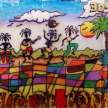The Evolution of Dystopian Fiction: From Orwell to Atwood!
This article delves into the evolution of dystopian fiction, tracing its journey from George Orwell's seminal work, "1984," to Margaret Atwood's contemporary masterpiece, "The Handmaid's Tale."

Introduction:
Dystopian fiction has long captivated readers with its bleak and often cautionary tales of future societies gone awry. This genre, which explores the ramifications of totalitarian regimes, environmental catastrophes, and societal collapse, serves as both a mirror and a warning. Over the years, dystopian fiction has evolved, reflecting the changing fears and anxieties of each era. This article delves into the evolution of dystopian fiction, tracing its journey from George Orwell's seminal work, "1984," to Margaret Atwood's contemporary masterpiece, "The Handmaid's Tale."
The Foundations: Orwell's "1984"
Published in 1949, George Orwell's "1984" is often regarded as the cornerstone of modern dystopian fiction. Set in a grim future where the Party, led by Big Brother, exerts total control over every aspect of life, the novel explores themes of surveillance, propaganda, and the erasure of truth.
Key Themes and Impact:
Orwell's vision of a totalitarian state where individual thought is criminalized and history is constantly rewritten resonated deeply in the context of post-World War II anxieties and the emerging Cold War. The concept of "Big Brother" has since become synonymous with invasive government surveillance, and phrases like "doublethink" and "Newspeak" have entered the cultural lexicon.
Legacy:
"1984" set a high standard for dystopian literature, combining political critique with a compelling narrative. Its influence is seen in countless works that followed, establishing a template for exploring the dangers of unchecked political power and the loss of personal freedoms.
Huxley's Brave New World
Aldous Huxley's "Brave New World," published in 1932, predates "1984" but is equally significant in the dystopian genre. While Orwell's world is one of repression and fear, Huxley's dystopia is characterized by pleasure and complacency.
Contrasting Visions:
In "Brave New World," society is maintained through technological and pharmaceutical interventions that ensure happiness and stability. The use of soma, a drug that induces euphoria without side effects, represents a different kind of control—one based on pleasure rather than fear.
Thematic Exploration:
Huxley's work critiques consumerism, the loss of individuality, and the dangers of a society that prioritizes stability over freedom. The novel raises important questions about the cost of technological advancement and the potential for humanity to become enslaved by its own creations.
Influence:
Huxley's vision has influenced numerous works that explore the intersection of technology and society. The novel's portrayal of a superficially perfect world that hides deep moral and ethical flaws continues to resonate, especially in discussions about biotechnology and the ethics of genetic engineering.
Bradbury's Fahrenheit 451
Ray Bradbury's "Fahrenheit 451," published in 1953, adds another dimension to the dystopian genre by focusing on censorship and the suppression of intellectual freedom. In this world, books are banned and "firemen" burn any that are found.
Themes and Social Commentary:
Bradbury's novel reflects Cold War-era fears of censorship and conformity. The protagonist, Guy Montag, begins to question the society that demands the destruction of knowledge and creativity. The novel emphasizes the importance of literature and free thought in preserving humanity.
Cultural Impact:
"Fahrenheit 451" has become a classic of American literature, often referenced in discussions about censorship and freedom of expression. Its themes remain relevant in today's world, where debates about free speech and the role of media in society continue to be contentious.
Atwood's The Handmaid's Tale
Margaret Atwood's "The Handmaid's Tale," published in 1985, brought a feminist perspective to the dystopian genre. Set in the near-future Republic of Gilead, a theocratic regime that subjugates women, the novel explores themes of gender oppression, religious extremism, and resistance.
Unique Perspective:
Atwood's work is distinguished by its focus on the female experience in a dystopian society. The protagonist, Offred, provides a harrowing account of life under a regime that controls women's bodies and reproductive rights. The novel explores the intersections of power, gender, and religion.
Modern Relevance:
"The Handmaid's Tale" has gained renewed attention in recent years, particularly in the context of global discussions about women's rights and bodily autonomy. The television adaptation has brought Atwood's vision to a broader audience, highlighting the novel's enduring significance.
Contemporary Dystopian Fiction
In the decades following Orwell, Huxley, Bradbury, and Atwood, dystopian fiction has continued to evolve, reflecting new societal fears and technological advancements. Contemporary authors have expanded the genre to explore issues such as climate change, digital surveillance, and biopolitics.
Climate Change and Environmental Collapse:
Authors like Paolo Bacigalupi in "The Windup Girl" and Margaret Atwood in her "MaddAddam" trilogy have tackled the looming threat of environmental disaster. These works envision worlds where ecological collapse has led to new forms of social organization and survival challenges.
Digital Surveillance and Data Privacy:
In the age of the internet and big data, dystopian fiction has increasingly focused on digital surveillance and the loss of privacy. Dave Eggers' "The Circle" explores a future where a tech company exerts near-total control over personal information, raising questions about the trade-offs between connectivity and privacy.
Biopolitics and Genetic Engineering:
Kazuo Ishiguro's "Never Let Me Go" and Atwood's "Oryx and Crake" delve into the ethical implications of genetic engineering and biopolitics. These novels examine the potential consequences of scientific advancements on human identity and societal norms.
The Resilience and Adaptability of Dystopian Fiction
Dystopian fiction's enduring appeal lies in its ability to adapt to changing societal concerns while maintaining core themes of power, control, and resistance. As technology advances and global challenges evolve, dystopian narratives offer a lens through which to examine our fears and aspirations.
Cultural Reflection:
Each era's dystopian literature reflects its unique anxieties and critiques. From Orwell's response to totalitarianism and Huxley's critique of consumerism to Atwood's exploration of gender oppression, these works serve as cultural mirrors, highlighting the issues that define their times.
Future Directions:
The future of dystopian fiction will likely continue to evolve, addressing new technological and societal developments. As artificial intelligence, climate change, and global politics shape our world, dystopian narratives will adapt to explore the implications of these changes.
Enduring Themes:
Despite the evolving contexts, the central themes of dystopian fiction—power, control, freedom, and resistance—remain constant. These themes resonate deeply with readers, providing a framework for understanding and questioning the world around us.
Conclusion
The evolution of dystopian fiction from Orwell to Atwood demonstrates the genre's capacity to reflect and critique the changing landscapes of society. Through the bleak visions of the future presented in these works, readers are invited to consider the consequences of unchecked power, technological advancement, and social control. As the world continues to change, dystopian fiction will remain a vital and dynamic part of literary discourse, offering cautionary tales and thought-provoking insights into the human condition
About the Creator
ED CLEFF
I have over a decade of experience in crafting compelling and diverse content. My portfolio spans multiple industries, including technology, healthcare, finance, and lifestyle, given me an added advantage in all my areas of specialization.
Enjoyed the story? Support the Creator.
Subscribe for free to receive all their stories in your feed. You could also pledge your support or give them a one-off tip, letting them know you appreciate their work.






Comments (1)
This was great!! I love dystopian fiction and all the novels you mentioned!